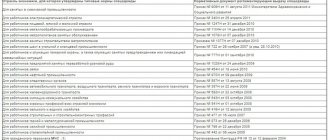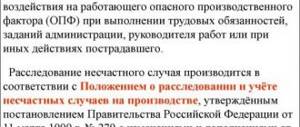Sooner or later, a conflict may arise between employer and employee. Disputes may arise due to failure of the parties to comply with the clauses of the employment contract. Such issues are resolved by a labor dispute commission created at the initiative of the employee or employer. Below we consider the procedure for the work of this commission, the rules for drawing up and submitting an application, as well as appealing the decision of the CCC. In addition, the employee has a choice of how to protect his rights, and in addition to the commission, he can exercise them through the labor inspectorate or through the court.
What is a labor dispute commission
The creation of a labor dispute commission is regulated by Article 384 of the Labor Code of the Russian Federation.
According to the provisions of this article, such a commission is created at an enterprise or organization both on the initiative of employees (employee) and on the initiative of the management of the institution.
In addition, former employees, as well as trade union bodies, can initiate the creation of a CCC.
The commission should consist of persons representing the interests of the manager and the interests of employees. Moreover, the number of representatives of both sides should be the same.
A labor dispute commission is created on the basis of a written proposal from one of the parties to create such a commission. Within 10 days from the date of receipt of the proposal, the notified party is obliged to nominate its representatives to resolve the dispute on its merits.
Composition of the commission
As mentioned above, the number of representatives from both sides should be the same.
Members of the commission representing the interests of management are appointed by the employer. And the members of the labor dispute commission, called upon to defend the rights of workers, are elected by the general meeting of employees in the organization.
In addition, at general meetings, similar commissions can be created in all structural divisions of a separate organization.
The competence of the labor dispute commission , created in a separate unit, is limited to resolving labor disputes exclusively within the designated unit.
The labor dispute commission consists of a chairman, a deputy chairman, and a secretary, who are elected from the total number of members of the commission.
All organizational activities of the labor dispute commission, including technical equipment, are provided by the management of the enterprise.
Complaint to the Moscow labor inspectorate
The Labor Code provides employees with the opportunity to appeal the decision of the CCC in court. However, the legislation does not provide for a direct prohibition on turning to other authorities to resolve a dispute.
Labor inspectorates deal with issues of violation of normal working conditions. As the name of the body already implies, it not only resolves the dispute, but also carries out all the necessary actions in order to detect not only the violation specified in the complaint, but also, possibly, a number of others.
Such a body exists in every region, including Moscow and the region. In addition to employees, other persons who have been unreasonably refused employment by their employer may also contact the inspectorate.
Subjects of labor relations carried out in Moscow can apply both in person and by mail, including electronic mail. To do this, in their application they need to indicate their contact information and employer information, the address of the organization, and then the essence of the complaint.
Please note that the labor inspectorate is located at st. Domodedovskaya, 24, building 3.
What issues does the CTS solve?
The Labor Dispute Commission is empowered to resolve a number of controversial issues that may arise during the activities of the organization.
The CCC considers exclusively claims of a material or non-material nature, called individual labor disputes. Such disagreements almost inevitably arise between management and members of the workforce.
And they are often based on ignorance of the law.
It is for the purpose of objectively considering the controversial situation and resolving the conflict that labor dispute commissions are formed.
These entities are competent to regulate the following issues:
- regarding wages and other types of payments to employees;
- issues related to violation of clauses of employment contracts;
- disputes arising in connection with the legality of applying disciplinary sanctions;
- accrual of travel allowances (overtime);
- other issues of a personal nature that employees and management could not resolve among themselves on their own.
According to the content of Article 385 of the Labor Code of the Russian Federation, the competence of the CCC does not extend to disputes that can be resolved strictly in court.
These include issues related to:
- reinstatement to previous position;
- reinstatement due to dismissal;
- compensation payments in connection with forced absences or accrual of differences in wages due to demotion.
The final decision on the above points can be made strictly within the framework of judicial proceedings.
However, prior to judicial settlement, one of the parties whose interests have been violated has the right to apply to the labor dispute commission for a preliminary verdict on the merits of the problem that has arisen.
For some issues that require mandatory pre-trial consideration, an initial appeal to the CCC is mandatory.
Application deadlines
The deadline for applying to the CCC is regulated by Art. 386 Labor Code of the Russian Federation:
- The employee is obliged to file an application no later than 3 months after he learned about the violation or should have known.
- If the deadline was missed for a valid reason, the commission may resolve the labor dispute on its merits by restoring the deadline.
If the issue is related to illegal dismissal, then you should immediately contact the CCC for a pre-trial procedure. Otherwise, in the future, the question of delaying the protest period may arise in court.
Activities of KTS
All the work of such commissions can be divided into several stages.
These stages are divided into:
- Contacting the CTS following an incident.
- Consideration of the incident in the order of a meeting.
- Collect additional evidence if necessary.
- Voting of members of the labor dispute commission.
- The rendering of a verdict and its subsequent execution.
If the institution has not previously created such a commission, citizens working in the organization, in the event of controversial situations, have the right to submit an application addressed to the head.
The statement will express the desire to consider the current situation within the framework of the CCC meeting.
If there is a misunderstanding with subordinates, the head of the organization himself can initiate the creation of a commission to consider the problem and make an objective decision.
Contacting the CTS
The first stage is an application to the CCC through an application addressed to the chairman of the commission, which is written in free form according to the general rules for writing applications.
The application should clearly state the problem that has arisen and your requirements regarding the substance of the problem. Additional documentation is attached to the application if there is evidence, if the applicant has any.
In the absence of a labor dispute commission, one is created within ten days from the receipt of a written proposal for its creation.
During the designated 10 days, the parties to the conflict elect their representatives in equal numbers.
After the delegates have formed the necessary quorum, the parties to the conflict are handed over the minutes of the future meeting.
CCC meeting
The conflicting parties are required to attend the CCC meeting.
It is possible to hold a meeting without the main parties to the dispute when the party that did not appear at the hearing notified this in advance in writing.
Typically, a request to consider a dispute in absentia is noted in the initial application. If any of the parties involved in the dispute fails to appear without prior notice, the meeting is postponed.
In such circumstances, the commission has the right not to consider the conflict at all. However, this does not prevent interested parties from re-applying for consideration of the dispute.
When holding a meeting, members of the commission must be guided by the fundamental provisions of the Constitution of the Russian Federation on the principles of universal equality before the law.
Decision-making must be based on the norms of current legislation. The consideration of disputes must be comprehensive, objective and unbiased.
The Labor Dispute Commission is not authorized to change court decisions that have entered into legal force.
Additional evidence
If the available data is insufficient to make a decision, CTS has the right to request additional documentation from management that will help clarify the situation.
Such documents may be:
- accounting documentation;
- memos;
- acts of violation of labor discipline;
- explanatory notes;
- orders, etc.
Documents presented as evidence may also be required in court if the parties fail to find a compromise before the trial.
Vote
Voting is carried out after the members of the CCC are fully familiar with the position of the parties and have studied the accompanying materials on the case.
The voting itself takes place in secret, that is, none of the members of the CCC announces their position.
The verdict is based on a majority of the votes received in writing.
At least half of the delegates from one and the other side of the dispute must take part in the vote.
CTS decision
By simply counting the majority of votes, the final decision of the CCC members is formed.
It indicates the essence of the dispute, the arguments and evidence considered, the legal basis and the final part with the decision made.
Within three working days, those involved in the conflict are given copies of the adopted decision.
From the moment they receive the verdict of the labor dispute commission, the parties are given a ten-day period to appeal the decision in court.
If, after a decade, none of the parties goes to court to appeal the verdict of the CCC, at the end of the period allotted for appeal, the responsible persons must execute the decision made by the CCC within three days.
Moreover, if the deadlines for appeal and execution have expired, and the employer does not comply with the prescribed instructions, the employee has the right to contact the Bailiff Service. Which should oblige the head of the organization to execute the decision of the CCC on the basis of the verdict.
When attracting FSSP employees, management will have to incur additional losses associated with paying the enforcement fee.
Decision making and execution
The decision on the outcome of the case is made by secret vote of the commission members who are present at the meeting. After it is accepted, a written act is drawn up, which indicates:
- name of the organization (structural unit);
- information about the head of the organization (structural unit);
- information about the employee who filed the complaint;
- date of application to the CTS;
- date of consideration of the case;
- information about the members of the commission who were present during the consideration of the dispute;
- information about witnesses and specialists invited to the meeting;
- justified decision of the commission;
- results of secret voting.
Copies of the act are transferred to the employee and employer within 3 days. The law gives them a ten-day period to appeal the decision. After the expiration of the specified period, the commission’s decision, unless appealed, must be executed within 3 days.
Failure to comply with the decision is grounds for bringing bailiffs into the case, who will enforce it forcibly within 3 months. The commission, if the employee submits a corresponding request within a month, issues a special certificate equal in force to a writ of execution.
However, it will not be issued if the employee or employer decides to continue to resolve the dispute in court.
Advantages of resolving disputes in the CCC
Labor law regulates the area of relationships between employers and subordinates, but the directives of the law are not always observed in fact.
Persons whose interests have been infringed have the right to defend their rights by all available means.
These include:
- Attempts to independently negotiate with management.
- Application to the labor dispute commission.
- Filing a complaint with the State Labor Inspectorate.
- Application to the prosecutor's office.
- Filing a claim with the courts.
A significant part of conflict situations arises due to basic ignorance of legal norms.
When it is not possible to build a constructive dialogue with management, contacting the CTS is the best option.
Without taking the problem outside the walls of the organization, the parties will have the opportunity to resolve the conflict in a better way.
The main advantages of this method of pre-trial settlement of disputes include:
- free and accessible;
- objectivity of consideration based on the norms of current legislation;
- significant speed of consideration, decision-making and their subsequent execution;
- efficiency due to the mandatory execution of the verdicts of the CCC.
Despite the fact that the law does not provide for the mandatory creation of a CTS, managers of companies whose staff exceeds 15 people.
It is highly desirable to create a commission on a permanent basis.
The authority of management will be higher if employees know that the organization strictly adheres to labor legislation and any incident will be considered impartially by members of the CCC.
No financial costs
Going to court is fraught with significant financial expenses. Despite the fact that the employee is exempt from the obligation to pay state fees when considering claims in labor disputes.
But not all citizens have the necessary legal knowledge. To fully represent your own interests, you will have to spend money on a qualified specialist.
There are no costs associated with applying to the commission for the applicant. Any employee will be able to independently defend their own interests. Starting from the stage of appealing to the CCC, ending with the process of considering the dispute by members of the CCC.
Objective assessment of what happened
Any incident is considered solely from the point of view of legal norms, without bias or pressure.
Often, using this method, it is possible to resolve disputes without taking them outside the organization, which is convenient for all parties to the controversial issue.
The verdict of the CCC in legal force can be compared with a court decision.
If the verdict has not been appealed within the prescribed period, it is binding on the same basis as a court decision.
Speed of review
Appeals to other authorities, including judicial authorities, may take a long time. Whereas the resolution of the situation in the CCC is carried out in a short time.
The law provides for certain periods within which the received application must be considered and the commission must make a decision.
In addition, it is much easier to provide evidence to the CCC than to other authorities.
After all, all the necessary documents, if necessary, must be provided by the head of the organization. Whereas the applicant will have to undertake the provision of evidence for other authorities.
Procedure for consideration
The consideration of the conflict occurs in several stages. Each of them is regulated by relevant legislation.
- writing an application;
- collection of necessary documentation;
- collection of evidence;
- paperwork;
- provision of materials to the commission;
- waiting for results.
Participants in the conflict have the right to introduce additional evidence, refute the opponent, ask the commission members to provide time to collect arguments, or attract independent specialists or create an additional inspection.
In addition, each of the parties to the dispute may ask to temporarily replace a member of the commission.
Reasons for disqualifying a member of the labor commission:
- personal hostility towards one of the parties to the dispute;
- friendly relations in relation to the participant in the labor conflict;
- incompetence in this matter;
- interest in a certain outcome of the case.
This is important to know: Early retirement: conditions for granting rights, benefits
Alternative options for resolving labor disputes
In addition to the possibility of considering labor disputes locally in the CCC of the organization itself, citizens can address these issues to other authorities.
Court
Any party to the labor relationship has the right to file a claim in court.
This can be done after the verdict of the CCC. If the decision made does not suit one of the parties.
The court may refuse to consider a labor dispute case in the following cases:
- when the applicant ignored the need to try to reach a judicial settlement by contacting the CCC;
- if there is a decision in the case that has entered into force;
- when jurisdiction is violated.
Not only enterprise managers and employees, but also former employees and trade union organizations can file a claim in court.
In addition, the prosecutor has the right to file a claim with the judicial authority. In this case, the parties to the dispute will be the employee and the organization itself, the head of which acts as a representative of the interests of the company.
Both the prosecutor and representatives of trade union bodies are only participants in the process. Even if the claim is filed directly by them.
State Labor Inspectorate
To resolve controversial issues related to labor activities, citizens can also contact the State Labor Inspectorate.
The competence of which is the consideration of labor disputes. The complaint can be submitted to the inspection in person or sent by registered mail.
The complaint can also be prepared electronically. Directly on the regional inspection website in a specially provided form.
A decision will be made on an accepted complaint within a month. Which will subsequently be sent to the applicant and the other party to the conflict.
The inspector's decision can be appealed in court.
Procedure for convening and operating the CCC: step-by-step instructions
Expert opinion
Kurtov Mikhail Sergeevich
Practitioner lawyer with 15 years of experience. Specializes in civil and family law. Author of dozens of articles on legal topics.
If it is impossible to resolve the dispute in another way, the employee submits an application to the commission on the subject of the dispute. The range of issues that can be resolved by the CCC is specified in its Regulations.
Therefore, it is important for the employee to study this local act before drawing up an application. Perhaps, to resolve his specific issue, it will be necessary to file a statement of claim in court.
This is important to know: Certificate of transaction size for an LLC: sample 2021







